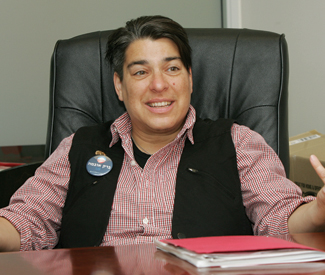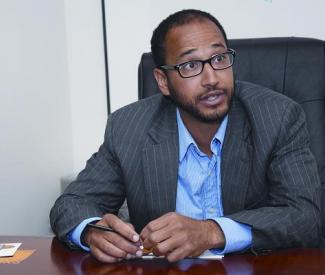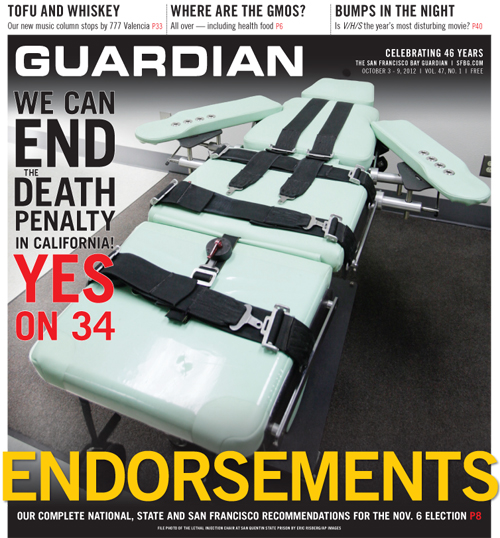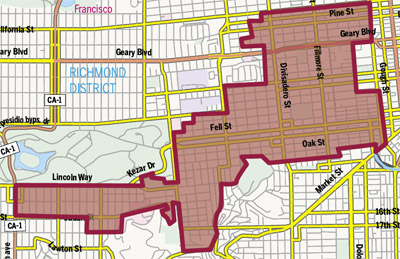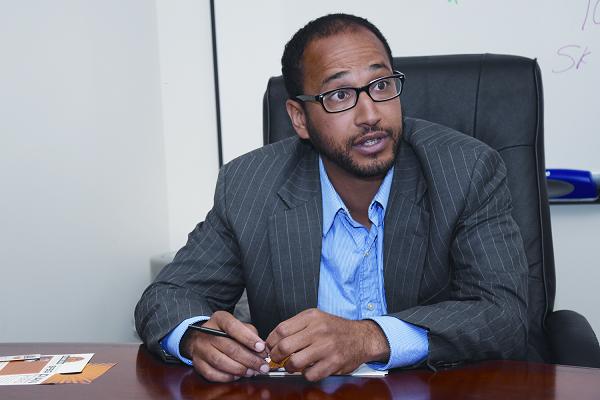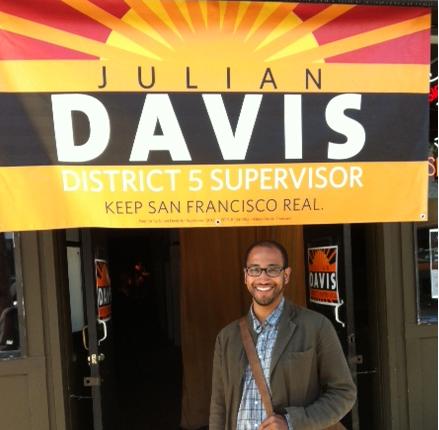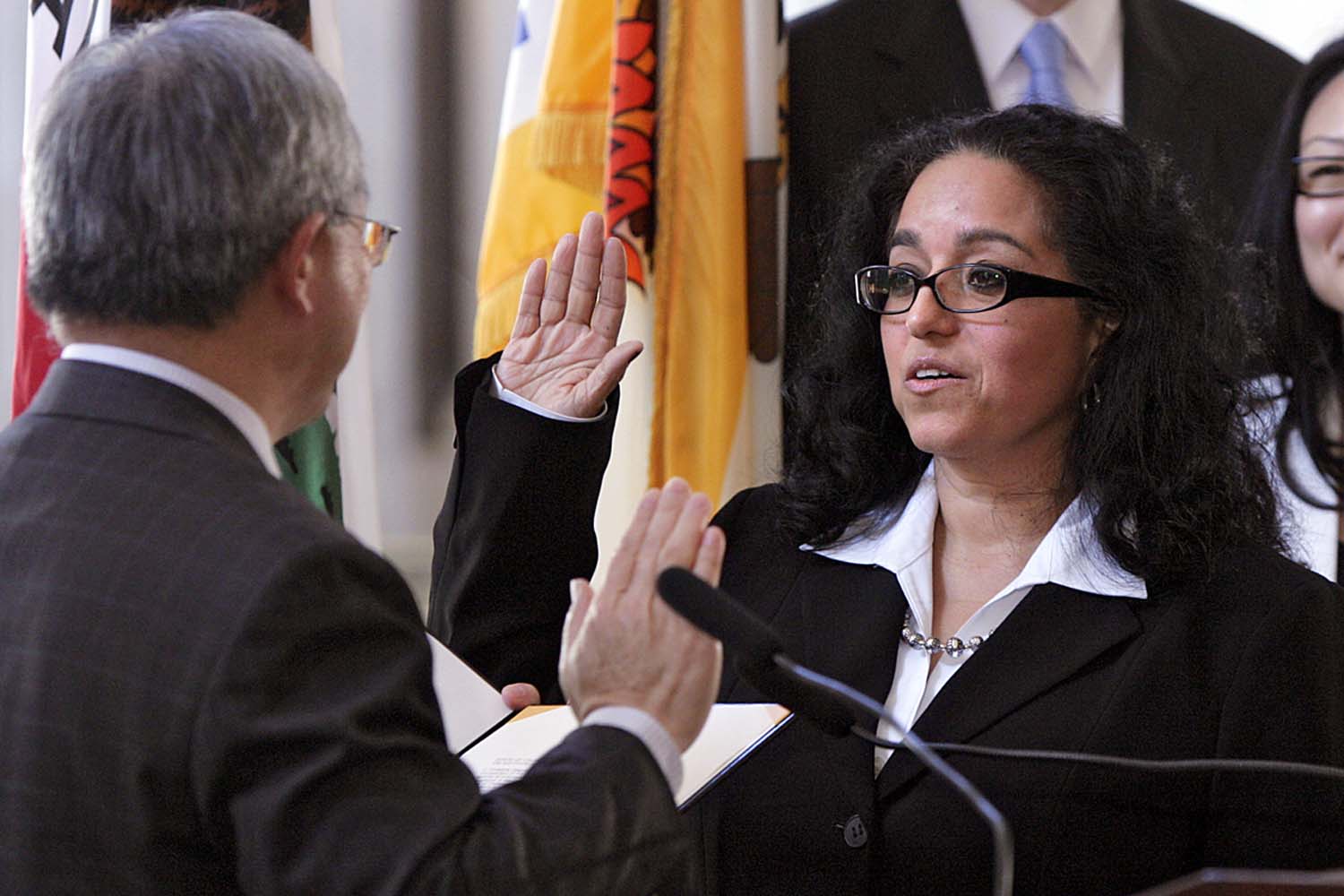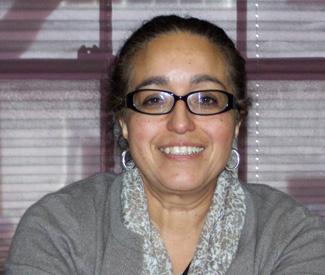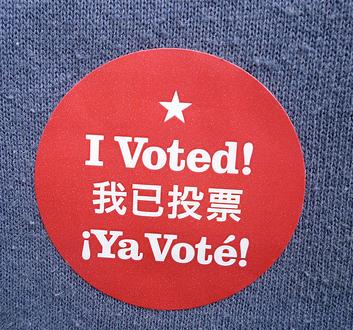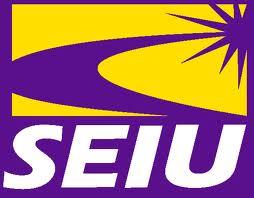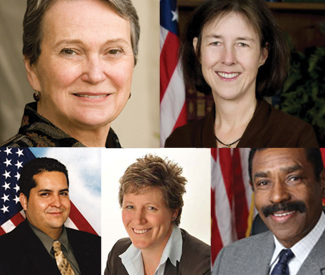San Francisco races
BOARD OF SUPERVISORS
DISTRICT ONE
ERIC MAR
In the fall of 2011, Supervisor Eric Mar introduced legislation banning the sale of toys as part of a fast-food meal promotion — and instantly, Mar and his colleagues became the target of national jokes. Right-wing radio went nuts. The Chronicle lampooned him. Even the Daily Show did a segment teasing him and suggesting that parents could control their kids’ nutritional intake just fine.
Lost in the media furor was the fact that a lot of parents — and much of the activists fighting the epidemic of childhood obesity — loved the law. And McDonald’s responded by ending free toys in its San Francisco happy meals. Also lost was the fact that Mar was, generally, a hard-working, serious-minded supervisor who has pushed for tenant and senior protections, better transit, and help for small independent businesses. He’s been a leader in the fight against chain stores and the malling of San Francisco.
His race for re-election is also one of the defining contests in San Francisco this fall.
We endorsed Mar with enthusiasm four years ago, and for most of his term, he’s done a fine job. But in the past few months he’s started to waver on key issues. He voted the wrong way on 8 Washington (condos for millionaires on the waterfront), and it was a struggle to get him to support Mike Hennessey over Ed Lee for mayor. He went completely south on the Sept. 25 vote giving the mayor complete control of the successor to the Redevelopment Agency. He voted in favor of a ban on recreation vehicles parking on city streets — a direct attack on homeless people. He’s been less-than dynamic on promoting new revenue sources. He’s siding more and more with the mayor and is no longer the reliable progressive vote he once was. And guess what? All of those pro-development, pro-mayor votes are now paying off for him — we hear Rose Pak, a key supporter of 8 Washington, is now out raising money for Mar. Ick.
But so far, Mar’s still rock solid on tenant issues — he helped create owner-move-in eviction protections for families with kids. He’s a strong support of bus rapid transit on the Geary corridor. He supports Clean Power SF (and eventual municipal ownership of the power grid). He has the support of every progressive elected official and organization and, for all his occasional bad votes, his re-election in a district that is not by any means the most left-leaning in the city is a high priority.
Mar’s opponent, David Lee, is the candidate of downtown, the landlords, and the cops. He has the support of Senator Dianne Feinstein, former Mayor Gavin Newsom, the Police Officers Association, Plan C, and just about everyone else in town who has sought to undermine progressive politics and legislation.
As executive director of the Chinese-American Voter Education Project, Lee has taken millions of dollars (including huge contributions from downtown interests, while refusing to provide a full breakdown) and used about a third of it on his $90,000 annual salary and that of his wife, Jing, according to federal disclosure records. While he claims to have registered 100,000 voters — claiming to highly value voting while sometimes failing to do so himself, according to election records — Lee’s more public role has been to repeatedly and deceptively go after the ranked-choice voting system and take other moderate stands in media interviews.
Lee served as a member of the Recreation and Park Commission since 2005, presiding over the controversial privatization schemes that have alienated so many San Franciscans that there is an unprecedented level of opposition to this year’s proposed parks bond.
Lee refused to come into the Guardian for an endorsement interview, or even to respond to our repeated calls with questions about his background and the false charges he’s been leveling at Mar.
They include the accusation that Mar is being backed by well-funded “special interests” because he has the support of labor.
With David Campos and John Avalos unopposed, and District 5 a fractious mess, much progressive energy is focused on Mar’s re-election. If Lee wins, it will be a huge setback to the progressive movement. We’re nervous about Mar, given his recent votes—but we’ll endorse him for another term.
DISTRICT 3
1. DAVID CHIU
We haven’t always been happy with David Chiu. After being elected as a progressive — and getting elevated his first week in office to board president — he started slipping into the moderate, sometimes squishy center. He supported the Twitter tax break (approving it before the company even presented a community benefits plan). He helped put Ed Lee in the Mayor’s Office, and was the swing vote approving the Parkmerced overhaul that drew strong opposition from tenant groups. He’s tried to water down efforts by Sup. David Campos to close loopholes in the city’s health-care law. He allowed the mayor to escape the real debate that was part of the voter-approved “question time.”
In his second term as president, he appointed some of the more conservative supervisors as committee chairs. In our endorsement interview, Chiu said he doesn’t believe those appointments have effected legislation — but Sups. Mark Farrell and Elsbernd have been actively sabotaging progressive appointments and initiatives on the Rules Committee, and Chu chairs the powerful Budget and finance Committee.
But on some issues, he’s been not only a good vote but a leader. He played a key role in trying to stop the 8 Washington project. He’s raised concerns about other waterfront development. He’s also in the forefront of the fight to make sure that neighborhoods get their fair share in the CPMC deal and that St. Luke’s remains a viable health-care option in the southeast part of the city.
Chiu has passed good environmental legislation, including streamlining the process to start urban agriculture projects and saving paper by limiting distribution of telephone books. He fought for the language access ordinance and the rights of immigrant parents in school board elections.
We wish Chiu weren’t so quick to compromise, particularly with the mayor. But none of his competition, including opera singer and perennial candidate Wilma Pang, have presented a stronger alternative. Chiu’s not perfect, but we support him for District 3 supervisor.
DISTRICT 5
1. JULIAN DAVIS
2. JOHN RIZZO
3. THEA SELBY
WE HAVE WITHDRAWN OUR ENDORSEMENT OF JULIAN DAVIS. MORE INFO HERE.
We hold this truth to be self-evident: District 5 is the heart of progressive San Francisco, the most left-leaning district in the city. The supervisor who represents the Haight, Western Addition, and Inner Sunset has to be a reliable part of the progressive community, someone who can be counted on to vote the right way pretty much 100 percent of the time.
That’s what we’ve had since the return of district elections in 2000. Matt Gonzalez was a Green Party member who (other than one unfortunate vote on school funding) held down the board’s left flank. Ross Mirkarimi, who on occasion clashed with his progressive colleagues, never went south on a single issue. We’re looking for a strong, progressive leader here, someone who can break new ground and launched dramatic new programs and ideas. But just as important, we’re looking for someone the left doesn’t have to worry about, someone who, when John Avalos or David Campos proposes a good piece of legislation, will always be in the yes column, and who, when the conservative supervisors propose something awful, will always be voting no. This isn’t a swing district; when the tenants and labor and the environmentalists and the people who support taxes on the rich and the housing advocates and the human-services community and the rest of the often-fractious but generally together progressive coalition are trying to count to six votes, they shouldn’t have to worry about where the D5 supervisor falls.
The supervisor from this district needs to be ready to defy the mayor when he’s wrong (which, sadly, is a lot of the time).
We wanted that person to be Christina Olague. A longtime community activist appointed by Gonzalez to the Planning Commission, Olague was for years part of the coalition that fought against the brutal displacement and economic cleansing that was the administration of Mayor Willie Brown. She was one of the most reliable voices on the commission, a rare vote for sanity in a time of madness.
We were pleased Mayor Ed Lee appointed her for Mirkarimi’s seat. And then she quickly let us down.
Olague voted in favor of the 8 Washington project. She worked with Sup. Mark Farrell, probably the most right-wing member of the board, to undermine ranked-choice voting. She voted to reappoint Mike Antonini, a Republican who is downtown’s best friend, to the Planning Commission. You can argue any of those votes, but the fact is, the two strongest progressive on the board — Avalos and Campos — were on the other side every time.
She’s also aligned herself with Brown, Lee, and Rose Pak, who have raised more than $50,000 for her re-election. She seems not to recognize that, as the next tech boom rolls in, city politics will be defined by a profound class struggle — and Brown, Lee, and Pak will be on the wrong side. It’s sad to say this after all of her history, but Olague isn’t the person to represent District 5 for the next four years.
There are a wide range of strong challengers — and while none of them are perfect, they present credible alternatives to Olague. Our choices are Julian Davis, John Rizzo and Thea Selby.
John Rizzo, as a leader in the local Sierra Club, has been part of the progressive coalition for years. As the president of the Community College Board, he’s been one of the reformers trying to keep that institution alive after more than a decade of corruption and mismanagement. He’s particularly strong on environmental issues, and would be a worthy successor to Mirkarimi, who engineered bills like the ban on plastic bags that put San Francisco in the forefront of the urban green movement.
Rizzo has to deal with the fact that he was at the helm when City College faced the greatest crisis in at least half a century. In retrospect, it’s hard to believe that even the reformers didn’t realize how much trouble was at hand and didn’t take greater steps to head off the crisis.
But Rizzo’s got the seasoning and the agenda to be a solid supervisor.
Thea Selby’s not as much of a lefty as Rizzo, but she’s a neighborhood and small-business advocate who got involved in politics organizing the Lower Haight after a spate of shootings outside her doorstep. She’s good on land-use issues and, while she unlikely to win, could have a political future if she stays active.
The other strong candidate in the race is London Breed, director of the African American Art and Culture Complex. She’s the only major candidate born in the district; she grew up in a housing project, living with her grandmother while many of those around her wound up in prison or dead. She’s a smart, compelling candidate with a tremendous amount of personal charm. She served on the Redevelopment Commission, voting the wrong way on the Lennar project, and is now on the Fire Commission.
The problem with Breed is that she’s too conservative for the district. She supported the ridiculous sit-lie law (and still defends it). She has the support of the Police Officers Association. She’s raised a ton of money, in part because the landlords like her. We do, too — but not as the D 5 supervisor.
The mayor has made the re-election of his appointee a high priority, and the outcome of this race will be in part a referendum on the power structure at City Hall. We’re going with Rizzo, and Selby.
SUPERVISOR, DISTRICT 7
1. NORMAN YEE
2. F.X.CROWLEY
3. JOEL ENGARDIO
You don’t expect to get a left-leaning supervisor from D.7, which is almost certainly the most traditionally conservative part of the city. For eight years, it’s been represented by Sean Elsbernd, a smart, effective, and honest advocate for homeowners and businesses who was wrong on most of the issues but trustworthy and accessible.
This time around, there’s a chance that D7 could move into the swing column; two candidates who would vote with the progressives at least some of the time are in strong contention.
Our first choice is Norman Yee, president of the school board and executive director of Wu Yee Children’s Services. Yee already has eight years experience in local government, and — while he, like all the D7 candidates, talks about public safety and quality-of-life issues, he also told us he’s “not opposed to taxes.” He’s supporting the City College parcel tax, Prop. A, and is open to looking at other revenue measures, including possible parking-lot taxes to pay for Muni.
He’s a little shaky on housing. While he called for an audit of all vacant city land to seek sites for new affordable housing, he supports tenancies in common and has no idea how the city can meet its General Plan housing goals. He’s working with campaign consultant Enrique Pearce, who is part of the more sleazy side of the mayor’s operation, and that gives us cause for serious concern. But on balance, he’s our first choice.
Crowley, who just stepped down as the head of the Theatrical Stage Employees Union, is an old-San Francisco kind of guy, a graduate of St. Ignatius who’s lived his entire life on the West side of town. He served on the Public Utilities Commission, where he was never much of a supporter of public power, is still dubious on Clean Power SF, doesn’t want to support much in the way of increased density west of 19th Avenue (except at ParkMerced) and is hardly going to be a progressive leader on the board.
He has a strong labor background, which cuts both ways: He’s likely to be horrible on development issues and will listen to the building trades people, but will also listen to SEIU on the city budget. Not our first choice — but he’s far better than Mike Garcia, who was a bad vote on the Ethics Commission and the Board of Appeals and is much more of a traditional pro-business, cut-taxes-and-regulations candidate. Garcia’s got the support of Elsbernd and will have plenty of downtown money, so we’re willing to go with Crowley as an alternative.
Engardio, a former writer for SF Weekly who once worked for the ACLU, is surprisingly conservative — he’s a low-tax, high-police-presence candidate whose positions, on paper, are as far to the right as almost anyone in the race. But he’s independent, is unlikely to win, and listing him as number three might help one of the other candidates edge out Garcia.
DISTRICT 9
DAVID CAMPOS
We could easily argue that Campos is the best member of the Board of Supervisors. He’s hard-working, pays attention to details, understands policy and politics and is one of the two most reliable progressives on the board. (It’s interesting that Campos and John Avalos, the two supes who refused to moderate their stands or compromise with the likes of Rose Pak, are now running unopposed; their constituents seem to like consistency and honesty.)
Campos is respected by his political opponents and trusted by his allies. He’s shown considerable legislative skill, managing to guide Clean Power SF through the board with a veto-proof majority. He’s been a strong advocate for Healthy SF and is trying to close the loophole some businesses use to exploit it. He’s been an outspoken voice for immigrants. We see a bright future of Sup. Campos, and we’re happy to endorse him for another term.
DISTRICT 11
JOHN AVALOS
At a time when the progressive movement of San Francisco has been hobbled by self-inflicted wounds and downtown’s divide-and-conquer strategy, John Avalos has stepped into an important leadership role. When we needed a mayoral candidate last year to represent progressive values in a large field of political moderates, Avalos was there, leading a strong second-place finish that showed the San Francisco Left is still a force to be reckoned with.
Earlier this year, it appeared that Avalos might have to endure a tough challenge by moderate union rep Leon Chow, who ended up dropping out of the race after media reports showed that he didn’t really live in the district. With a walk to reelection, Avalos was freed up to represent progressive San Francisco interests at the bargaining table opposite the Mayor’s Office and business community on two of this year’s highest profile struggles: reforming the city’s business tax and creating an Affordable Housing Trust Fund.
In both cases, Avalos needed to play political hardball and practice some risky brinksmanship, threatening to place competing measures on the ballot right up until the end. The resulting compromises that he helped forge, Propositions C and E, include tens of millions of dollars in new revenue that Mayor Ed Lee opposed, which will help save city programs and keep working class San Franciscans from being forced out of the city.
Avalos is a classic district politician, focusing much of his energy on advocating for the needs of Excelsior and other District 11 residents. But he has also become an important citywide leader, and he has our full support.
COMMUNITY COLLEGE BOARD
CHRIS JACKSON
RAFAEL MANDELMAN
STEVEN NGO
AMY BACHARACH
Every one of the 11 people running for Community College Board trustee — incumbents and challengers alike — agrees that the system is a godawful mess. The Western Association of Schools and Colleges has warned San Francisco’s largest educational institution that it will withdraw accreditation in 2013 if City College doesn’t make dramatic changes in its financial and governance structures. A school that serves 90,000 people and is critical to the city’s immigrants, job-seekers, and business community is facing the worst crisis in its history, with the unthinkable prospect of shutting down looming on the horizon.
That said, we need to add a bit of perspective here: City College is going to survive. The board has already hired an outside trustee to monitor its compliance with WASC’s recommendations, and by next spring, WASC is going to approve the school’s accreditation.
But along the way, the district is going to have to make some major changes that could shift its essential mission and alter the role City College has played in the community. Put simply, WASC and the state agency that oversees community colleges want City College to become more of a traditional junior college, designed to prepare students for transfers to four-year institutions, at the expense of adult education, English as a second language, and job training. The people who will decide the district’s fate want fewer teachers, fewer campuses, more administrators, and higher financial reserves — even if that means serving a smaller number of students.
It’s going to be tricky: School officials will have to thread a sharp political needle to emerge without lasting damage. And the question for the voters is simple: Who is best qualified to make sure that the school meets the WASC requirements — without gutting everything that’s important about the San Francisco Community College system?
We approach this with a couple of observations. The problems at City College aren’t new — they’re the result of many years of incompetence, malfeasance, corruption, secrecy, and lack of accountability that was driven by the elected board and infected every aspect of college operations, culminating in a scandal that resulted in felony charges against the chancellor. For more than a decade, a board majority that at best ignored and at worst empowered bad administrators and worse decisions ruled the college like a private fiefdom. Natalie Berg, who is running for re-election, was neck-deep in the sleaze. Milton Marks, who died in August, was often the only voice for honesty and sanity.
In the past few years, Marks found some allies as John Rizzo, Chris Jackson, and Steven Ngo joined the board, and since 2009, the reformers have had a clear majority. They haven’t been perfect, by any means — and it’s hard to deny that they were at the helm when the crisis hit, and could and should have move earlier to avert it. But they’ve at least made a credible effort to dig the school out of its mire.
Along the way, they’ve had to cut the budget by 20 percent — and made conscious decisions to preserve a professional teaching force and a broad mission, even if that meant laying off administrators and accepting lower-than-normal levels of reserves. Right or wrong, those were honest policy moves — ones that happen to conflict with what the state and WASC currently want.
It’s tempting (particularly when WASC complains about board dysfunction, which actually means that the members sharply disagreed, for very good reasons, on a lot of issues) to call for throwing out all the incumbents. But that’s a mistake; two incumbents are on the right side of the reform battles and have a vision for the school’s future. We’re also endorsing two challengers who offer a valuable fresh perspective.
Chris Jackson, a researcher with the San Francisco Labor Council, is running for his second term. He’s the only board member who voted against hiring a special trustee to oversee the districts WASC compliance — and he raised valid points about the trustees role and authority. He’s been a strong supporter of the reform agenda, and while he needs to understand that resisting the WASC demands entirely is a recipe for disaster, and that the board needs to accept greater fiscal discipline even if it means cutting programs he supports, Jackson’s voice is needed as the board moves forward.
Rafael Mandelman is a lawyer who’s been involved in progressive politics in the city for years. He’s an honest, principled activist respected by people across the political spectrum. He told us he has no illusions about the challenges ahead — or about challenging everyone, including his allies on the board, if that’s what it takes to save City College. “Short term,” he told us, “it’s all bad” — and he has the clear eyes and integrity to make the painful decisions. In a bitterly divided board, he may be something of a peacemaker, since nobody on any side doubts his intentions.
Steven Ngo, a civil rights lawyer, has been an exceptional board member, someone who respects and supports the district’s broad mission but has no illusions about the financial problems. He’s been complaining for years about the lack of centralized accounting systems, about the district’s lack of control over employee health spending — and about absenteeism among some board members, which has been a serious problem. He’s talking about fixing the basic problems first, including a system of internal governance that is so diffuse it often seems nobody knows who’s in charge.
Amy Bacharach, a policy researcher for the state court system, knows the value of education — she went from high school dropout to Ph.D. in 20 years. She agrees that the district shouldn’t abandon its commitment to adult education, ESL, and non-credit classes, but also agrees with WASC that the governance system is far too loose and that the board needs to centralize decision-making. She has progressive values and a clear head for what needs to be done, and would be a strong ally for Jackson, Mandelman and Ngo.
We also liked William Walker, the current student trustee, who has lots of great ideas and knows more about the district than almost anyone but as a student with a job and a role on the board, he isn’t running much of an effective campaign; he has a future in local politics, and ought to run again in two years when he has less on his table. Hanna Leung offered some solid ideas and was also a strong candidate.
But right now, in this race, at this time, we’re backing Jackson, Ngo, Mandelman, and Bacharach.
BOARD OF EDUCATION
SANDRA FEWER
JILL WYNNS
SHAMANN WALTON
MATT HANEY
It’s safe to say that nobody else in town is endorsing this particular slate of candidates. But it reflects our complicated and nuanced perspective on the state of the San Francisco public schools.
It’s important — critically important — to recognize that the local schools have improved dramatically over the past few years. When you see the actual data, it’s almost a miracle — at a time when the district has lost almost 20 percent of its state funding, when schools are begging parents to donate pencils and paper because there aren’t enough basic supplies to make it through the year, student achievement is up by almost metric. SFUSD is the best performing large urban district in California. There are more good schools and fewer failures. Test scores continue to creep upward. The racial achievement gap, while still unacceptable, is narrowing. Enrollment at the elementary level, once in sharp decline, is growing as faith in the schools improves.
The administration of outgoing Superintendent Carlos Garcia was refreshingly open; the gag orders and repressive programs of his predecessor, Arlene Ackerman, are gone. Garcia’s anointed successor, Richard Carranza, is following the same track. And the often fractious board is working together remarkably well.
That said, there are serious issues facing the district. The bitter fight over layoffs this spring has left the board, the administration, and the teachers union on terrible terms. The student assignment process, the budget, school transportation, the meal programs, the future of honors tracking, and immersion programs all present massive challenges. And in the middle of all of this are 55,000 students and their families, who can’t afford to wait around while the elected officials and administrators figure out what to do.
That’s why we’re endorsing a mix of veterans and newcomers, people who aren’t always on the same page politically but who share a commitment to public education and who offer both institutional memory and new ideas.
For the record: We have immense respect for the teacher’s union, the United Educators of San Francisco, and we (properly) take what the union says very seriously. It’s rare that we disagree. But the union has taken one issue — the vote to skip seniority and preserve the jobs of 70 lower-seniority teachers in a handful of underperforming schools — as the single litmus test for this election. That’s meant opposing all the incumbents — even if it means endorsing candidates who have opposed much of what the union stands for and who are otherwise unqualified for the job. We recognize the importance of seniority and the problems with that vote, but it’s only one of the many factors we considered in our decisions.
There’s nobody in this race we consider a flawless advocate for progressive school policies and reform. But four people are going to win, and we’re going with the best four.
Sandra Fewer was elected four years ago as the consensus candidate of the entire San Francisco left, and in some ways, she’s lived up to her promises. She’s been a leading advocate for restorative justice in the school disciplinary system, got ethnic studies added into the high school curriculum, and has made LGBT issues a priority (including training for gym teachers on trans youth). She was on the right side of the JROTC vote and is a strong advocate for students of color. She’s well informed and does her homework.
She also led an embarrassing and unproductive effort to keep Margaret Brodkin, an eminently qualified candidate, off the board two years ago, hurting her credibility in a lot of circles. She infuriated the teacher’s union by joining the majority on the skipping vote. Still, Fewer’s been a valuable voice on the board and deserves another term.
Jill Wynns is often at odds with Fewer and other progressives. She was utterly wrong on JROTC, pushing to preserve a military recruitment program in the public schools. She supported the horrible superintendent Arlene Ackerman all the way to the bitter end, damaging the district’s reputation (and her own). She’s been on the board for 20 years and there are a lot of people, many of them our friends and allies, who say it’s time for her to retire and make room for new blood.
If this were a one-person job, we wouldn’t be supporting her.
But Wynns has immense institutional memory, she cares deeply about the district and its students, and she represents a PTA-parent constituency that deserves a voice on the board. She’s serving as the president of the California School Boards Association, and has moved that conservative organization a few millimeters to the left. We don’t always agree with Wynns, but we’re supporting her re-election.
There are a number of credible challengers this year. Shamann Walton and Matt Haney are our favorites.
Walton, who runs a workforce-development agency in Bayview Hunters Point, is a product of the public schools in San Francisco and Vallejo, a former public school teacher in Vallejo, and a parent of kids who went through public schools. He told us he wants to see if the district can leverage state and federal job-training money to expand educational opportunities. He supports restorative justice and would be a voice for African American kids. He would need to learn more about the district budget and district operations, but he’s a bright, engaging person who can quickly come up to speed. He has the support of the Coleman Action Fund, Assemblymember Tom Ammiano and Sups. Eric Mar, David Chiu and John Avalos.
Haney, the executive director of the UC Students Association, has a Masters Degree in education and a strong background in educational policy issues. He’s focused on bringing more resources into the district, talking about new parcel taxes and fees on big private developers to fund the schools. He’s familiar with a wide range of district issues, from the core curriculum requirements to the honors-track debate as well as transportation and school food and would have a short learning curve.
We also liked Sam Rodriquez, Gladys Soto and Kim Garcia-Meza, who offer creative ideas and would probably make fine board members. And we recognize that incumbent Rachel Norton has been a powerful and effective advocate for special-needs kids and a proponent of healthier school food.
But our four choices reflect the balance we see as the best hope for continuing the progress the district has made while making the dramatic improvements the students and teachers still badly need.
San Francisco ballot measures

